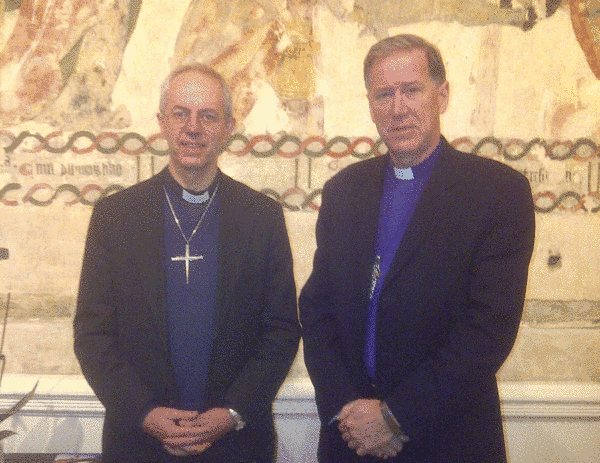Rowan Williams spent ten years attempting to synthesise a middle ground between Anglican liberals and conservatives: ten years of conversation, Indabas and listening. It didn’t work because it is no more possible to find a convincing middle ground between the Gospel and an anti-Gospel than it is between the propositions: 1+1=2 and 1+1=4.
Justin Welby seems to have caught on to the fact that Rowan Williams’ efforts fell flat so, instead, he is attempting to reconcile…. something – I’m not sure what. And therein, I suspect, lies the problem. Two people or groups can be reconciled to one another in the sense that they can mutually forgive one another for past wrongs – something that has been a hallmark of Welby’s ministry to date – but contrary propositions can no more be reconciled than they can be synthesised.
So while he may be able to convince the warring factions in the Anglican Communion that they should not hate each other and may even sit in the same room together, I cannot see much hope for reconciling the beliefs that have driven the two sides apart.
And without that, the reconciliation will be a shallow veneer of strained tolerance that will crack at the first hint that someone is about to express a firmly held conviction.
Read the complete address here:
The Crooked, Straight Path of Reconciliation.
Reconciliation is recognition of diversity and a transformation of destructive conflict to creativity. It holds the tensions and challenges of difference and confronts us with them, forcing us to a new way of life that accepts the power and depth and radicality of the work of the Holy Spirit in our conversions.
We speak often in foreign policy of failed states, or failing states. Their common characteristic is the inability to manage diversity and grow with it, enabling it to change them significantly into better places. The core of the American sense of exclusivism is often found within that vocation of being a diverse and thriving nation.
If the Church is not a place of reconciliation it is not merely hindering its mission and evangelism, appalling as such hindrance is, but it is a failing or failed church. It has ceased to be the miracle of diversity in unity, of the grace of God breaking down walls.


 One of Fred Hiltz’s recurring nightmares is that Canterbury recognises ANCA and ANiC, making ACNA an official North American Anglican province with ANiC as one of its dioceses. In order to forestall this calamity, Hiltz has taken his “ongoing concern” to Justin Welby.
One of Fred Hiltz’s recurring nightmares is that Canterbury recognises ANCA and ANiC, making ACNA an official North American Anglican province with ANiC as one of its dioceses. In order to forestall this calamity, Hiltz has taken his “ongoing concern” to Justin Welby. As of this writing, it hasn’t been officially announced, but it seems reasonably certain that the Bishop of Durham, Justin Welby is to become the next Archbishop of Canterbury.
As of this writing, it hasn’t been officially announced, but it seems reasonably certain that the Bishop of Durham, Justin Welby is to become the next Archbishop of Canterbury.